In 2020, Lukashenka was elected to a sixth term in an election that was marred by widespread electoral fraud. Protesters took to the streets, and an estimated 6,000 were jailed and tortured by the government. Thousands were forced to flee the country.
In June, Nikolayenko traveled to Poland and Lithuania for three months to interview natives of Belarus, a country of 9.3 million people bordering Russia and Ukraine.
“People in the United States sometimes forget how elections are not something that you can take for granted,” said Nikolayenko, a professor of political science whose research focuses on social movements and comparative democratization in Eastern Europe and the former Soviet Union.
“They’re not something that just falls from the sky. They’re something that people fight for and, in some cases, lose their lives.”
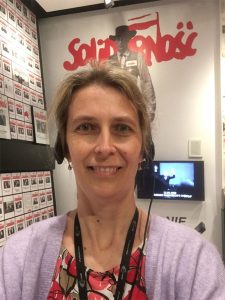
Nikolayenko had previously written about the “staggering level of mobilization” that materialized in the aftermath of the 2020 election in Belarus, despite the extreme danger participants faced, and focused on the role of emotions in generating mass mobilization.
A grant from the U.S. Department of State and support from the American Councils for International Education allowed her to travel to the region, and the European Humanities University in Lithuania and the Institute of Political Studies at the Polish Academy of Sciences provided administrative support.
Nikolayenko conducted in-depth interviews with 23 industrial workers and other members of trade unions. Past protests against the government had mostly attracted university students and white-collar workers, but in 2020, blue-collar workers joined in large numbers, and as a result, many of those same workers were forced to flee the country.
She said most of the political movements she’s studied over the years were carefully planned years before elections, but this one was more spontaneous and was driven by feelings of injustice.
“I was interested in understanding why some industrial workers joined while others did not and why the level of labor mobilization was higher at some state enterprises than others,” she said.
Nikolayenko will publish her findings in an academic journal in the future, but in the meantime, she’s sharing the lessons in Youth and Politics, a course she’s teaching undergraduates this semester.
Class discussions range from the ethics of interviewing to the role of the students’ generation in preserving democracy. The latter is especially important now, given the erosion of democratic norms in Europe and the United States, she said.
“Given what is happening in the United States right now, with the level of polarization and populism and everything else, it’s important to stress the idea that the quality of democracy is something that cannot be taken for granted,” Nikolayenko said.
“People need to take a very active stance and remain engaged in politics, and the people of Belarus are trying to do it in very precarious conditions.”
]]>At boisterous local rallies and during intellectual discussions of the war, they’ve been inspired by expressions of support for the Ukrainian people, they said, but in quieter moments, they can be overcome by grief.
“There has been so much guilt and helplessness—it’s hard to do anything,” said Julia Kadar, a first-year Fordham College at Lincoln Center student. “I feel like, how dare I study for midterms and do homework and worry about my grades and worry about my future when there are people, children, whose futures have been taken away from them.”
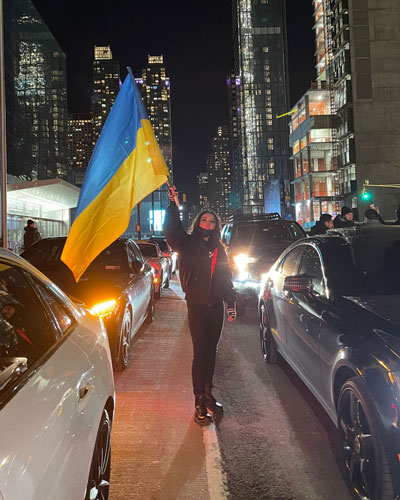
Keeping Up from Abroad
Kadar’s Ukrainian-born parents live in the United States, but her grandparents, aunts, uncles, and cousins still live in Ukraine, near the country’s border with Romania. Some of her cousins are fighting in the war, while other family members have taken in people who fled the eastern part of the country in recent weeks.
“Everyone’s scared. No one thought that this would happen,” she said. “I remember speaking to my grandpa three days before the war happened, and I asked him, ‘Oh, there’s rising tensions between Russia and Ukraine, has anything affected you guys yet?’ He was saying, ‘No, no, everything’s fine,’ and so no one thought that three days later, cities would be bombed.”
Dr. Areta Bojko, who graduated from Fordham College at Rose Hill in 2014, is currently an obstetrics and gynecology resident at Tufts Medical Center in Boston. She said that in the past month, she has struggled balancing her life in the United States with a sense of responsibility to her family in Ukraine.
“We’re not there in Ukraine—we’re here in America, living our lives, and when these things happen, it tears you apart in a way because you want to be there and you want to physically be on the ground supporting, but you still have to go to work every day and show up,” she said.
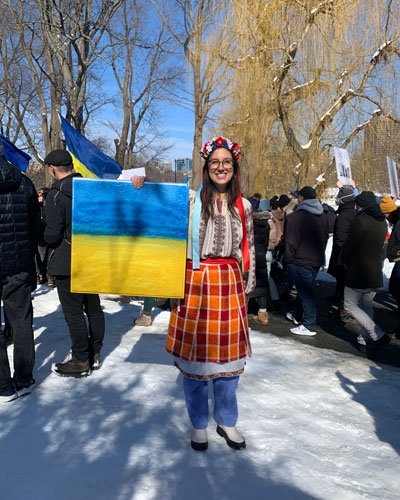
For Bojko and her family, reports of Ukrainian refugees in Europe evoke a kind of déjà vu.
“My parents would have been born in Ukraine had it not been for a very similar situation during World War II, when their parents had to flee Ukraine,” she said. “They were born in Poland and in Germany, so if you can imagine moms that are fleeing now, that are pregnant from Ukraine, delivering in these countries that they’re fleeing to—that’s exactly what happened to my parents.”
For Fordham men’s basketball player Rostyslav Novitskyi, who was born in Kyiv, the Russian invasion coincided with the lead-up to the team’s participation in the Atlantic 10 tournament.
“It’s painful. It’s very hard,” he told the New York Post after scoring a career-high 10 points in Fordham’s Feb. 28 victory against the University of Massachusetts. “I’m stressed. It’s really hard to see what’s going on with my country.”
Putting the War in Historical Context
Olena Nikolayenko, Ph.D., a professor of political science at Fordham, emphasized the history of Ukraine’s occupation—not only during World War II, when it was invaded by Nazi Germany, but also since 2014, when Russia seized the Crimean Peninsula from Ukraine and occupied eastern parts of the country.
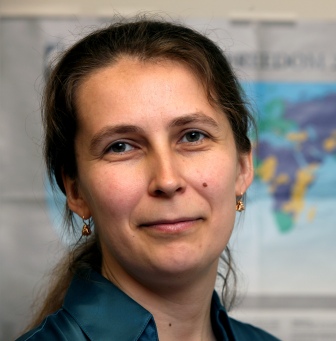
“The war hasn’t just started last month—it’s been going on for the past eight years,” said Nikolayenko, who grew up in Ukraine and has published two books on youth in Eastern Europe, with a particular focus on the role of nonviolent youth movements in advancing democratization.
The international community has refused to recognize the Russian annexation of Crimea, but for years it has viewed the fighting in the Donbas region of eastern Ukraine as a “low-intensity” conflict, Nikolayenko said, and, until recently, continued to do business with Russia as usual. Many European countries still spend millions of dollars to purchase Russian oil and gas, which is used to help finance the war.
“So it was painful to watch for the past eight years, but of course, in recent weeks, with an escalation in violence and the full-scale invasion of Ukraine, the bombardment of residential areas, hundreds and thousands of deaths of civilians, including children—it’s just heartbreaking to watch from afar how the country is under attack,” Nikolayenko said.
Bojko said that the trauma in Ukraine is more intense and widespread now, but it has evoked the same mixture of emotions she felt in spring 2014, when she was a senior at Fordham and the war began.
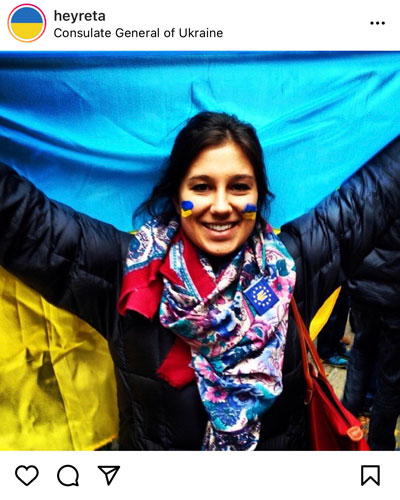
“I was looking back at my photos, and I am seeing my Instagram posts from 2014 with a flag—holding up a flag and I’m at a protest, and here it’s happening again,” she said. “I don’t know, it feels helpless, I guess you could say.”
Finding Community, Extending Support to Ukraine
Since the invasion, Bojko has connected with fellow members of the Ukrainian Medical Association of North America, and they’ve been working to gather donations and medical supplies for hospitals in Ukraine.
Kadar said that despite feeling helpless, she’s helped organize prayer vigils and rallies while supporting other efforts in New York City and on campus, including a monthlong donation drive led by Fordham’s chapter of Student Veterans of America to aid those in Ukraine.
“The day the war started, I organized a rally for the next day, and students from Fordham Lincoln Center marched to Times Square—I did not expect so many people to show up,” she said. “It was amazing to see that people actually cared.”
The Fordham men’s basketball team has stood in solidarity with Novitskyi. Players wore the Ukrainian flag on their jerseys for the final few games of the season, and before a home game against the University of Massachusetts in February, they participated in a moment of silence for Ukraine.
“I’m very glad my team and my school supports me,” Novitskyi told the New York Post. “I feel their support and I’m very appreciative of that. … It really feels like they love me and they are trying to help me and make me feel better. It feels like we’re a family.”
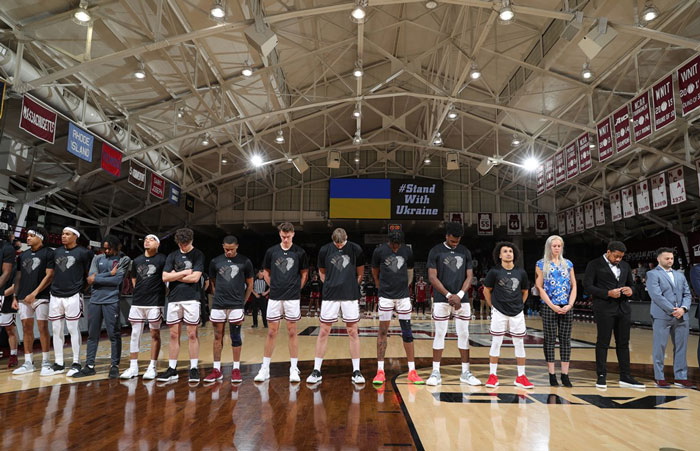
Nikolayenko said that she’s working with other university professors to provide resources, such as scholarship and fellowship opportunities, to students and academics fleeing Ukraine. She’s also using her platform as a scholar and public intellectual to share her expertise and help people understand the war and its impact. On March 11, for example, she co-organized and chaired a roundtable called “Women and Russia’s War on Ukraine.”
“In every war, usually men are seen on the front lines, but I wanted to highlight the role of women in the war,” both in the military and as activists, she said. “There are a lot of women who chose not to flee and who stayed, and they try to be helpful in any way they can. I’m a university professor—I’m not a military expert, and I can’t fight on the battle ground. But I think many Ukrainian Americans try to work on different fronts, wherever they can put their skills to the best use.”
Keeping the Focus on Ukraine and What Comes Next
One of the best ways to put those skills to use is to keep the conversation on Ukraine at the forefront, especially as the war drags on, Nikolayenko said.
“People can get tired of all the horrific scenes that they see from Ukraine, and they might lose interest in the war crimes that the Russian military commits,” she said. “That’s why it’s important for university professors, journalists, and public intellectuals to speak up and keep Ukraine on the public agenda.”
Kadar said she’s trying to do that through her social media platforms. “I almost feel bad for having to ruin people’s stream of scrolling, but there’s a war going on,” she said, and she wants people to be “mindful” of its impact on the Ukrainian people and to appreciate things that can be taken for granted such as family, shelter, and food.
Bojko said she’s been encouraged by the outpouring of support for Ukraine among people in the U.S. and throughout the world.
“My one worry is that people are going to forget about this issue in a week or two, and I just really hope that we can keep the momentum going with helping Ukraine and not be desensitized to what we see in the news,” she said. “I would really urge people to not forget, and not turn away—really lean into it and try to learn about it.”
Nikolayenko said that even those without close connections to Ukraine should continue to pay attention because she believes the future of democracy is at stake.
“This war is not just about Ukraine’s national independence and its fight for survival,” she said. It’s “indicative of a global trend where we observe a resurgence of authoritarianism across the globe.”
]]>For many years, NATO did not admit Ukraine or Georgia to its ranks because its members were afraid that Russia would retaliate by invading Ukraine and other countries, said John Davenport, Ph.D., philosophy professor and director of Fordham’s minor in peace and justice studies. But the effort to placate President Vladimir Putin has gotten us nowhere—except for a war that will result in millions of refugees, hundreds of billions of dollars of damage in Ukraine, and possibly a worldwide recession, he said.
“What we should be doing now is matching him tit for tat … We [should]admit Georgia next year. And as soon as this war is over in Ukraine, we’ll admit Ukraine as well. We’re going to stand up for a no-fly zone. If he takes further aggressive actions, maybe we’ll get rid of the puppet regime that [he’s] supporting in Venezuela. We’re in a new cold war here,” Davenport said. “Putin is doing this partly because he thinks we’re weak-willed, right? That countries in the NATO alliance don’t have the will to fight. If we don’t show him that’s not true, we’re going to end up—by the end of this century—with a world perhaps completely ruled by dictators.”
In the virtual panel on March 4, Davenport and Olena Nikolayenko, Ph.D., a Ukraine native and chair and professor of Fordham’s political science department, explained how Western foreign policy led to the Feb. 24 invasion of Ukraine and offered ways that the U.S. can alleviate the conflict.
A Mission to Revive the Soviet Union
In 1991, the Soviet Union collapsed and Ukraine became an independent state. For Putin, the dissolution of the Soviet Union was the “greatest catastrophe of the 20th century,” said Nikolayenko.
“He’s on a mission to reset Russian greatness and revive the Soviet Union,” said Nikolayenko, who is originally from Ukraine and has held prestigious positions in several U.S. universities. “This year marks the centennial of the establishment of the Soviet Union, which was set up in 1922. So to some extent, maybe it’s not an accident that he decided to launch this military campaign in order to rewrite history.”
Since Putin came to power in 2000, he has successfully seized territory from Russia’s neighbors—Georgia and Ukraine—and supported dictatorships across the world, including the Assad regime in Syria, said the professors. Now he has started “the largest ground war in Europe since World War II,” said Nikolayenko.
Years of Assumptions and Appeasement
There are several factors that emboldened Russia, particularly Western foreign policy, said Nikolayenko. U.S. presidential administrations often downplayed Russia’s belligerent behavior, she said. They expressed concern and implemented soft sanctions to signal disapproval of Russia’s actions, but they continued to maintain diplomatic relations and trade and purchase energy resources from Russia, which inadvertently provided financing for Russia’s military, she said.
“Over the past decade or more, Western governments tried to appease Russia. They assumed that if Russia takes over just one piece of land—a piece of Moldova, a piece of Georgia, a piece of Ukraine—then the incumbent government in Russia can be appeased and the West can continue to have economic, political, and cultural relations with Russia,” Nikolayenko said. “But of course, as we can see now, this policy might not work very well.”
Finding Solutions: Aid, Trade, and a NATO No-Fly Zone
Nikolayenko said that countries can help Ukraine by providing humanitarian assistance for refugees and military aid for the Ukrainian army. She shared several resources with panel attendees, including a list of charity organizations and upcoming anti-war protests worldwide.
She said that countries can also stop trading with Russia, especially in the oil and gas industries, which would significantly undercut Russia’s ability to finance the war. Davenport added that it will be difficult to make Europe independent of Russian energy, but it’s possible within the next decade.
“In the long run, it would take a huge investment—maybe five, 10 years at least,” Davenport said. “We could [massively increase]shipping natural gas … There are other countries that could do the same. This could be the beginning of a big push in Europe to try to become free of Russian energy dependence.”
The U.S. and Western states can also introduce a no-fly zone over Ukraine, which would reduce deaths and overall destruction in Ukraine, said Nikolayenko. However, audience member Annika Hinze, Ph.D., associate professor of political science and director of the urban studies program, pointed out a potential conflict.
“NATO allies are concerned that if they established and policed a no-fly zone over Ukraine, Russia would not respect it and start shooting down NATO fighter jets, putting NATO at a direct confrontation with Russia, and essentially escalating the war into a Great War (and potentially a nuclear conflict),” Hinze typed into a Zoom chat box. “As an expert, do you think these concerns are warranted?”
Nikolayenko said that she didn’t see how, militarily, the Ukrainian army could stop the bombardment of its cities without a no-fly zone.
“The United States and Western states have the military capacity to confront Russia, but they are reluctant to do it,” Nikolayenko said, adding that these countries are worried about further escalating the war. “And this is a source of frustration for many people in Ukraine because the world is watching and not willing to go that far.”
This event was sponsored by Fordham’s Pi Sigma Alpha chapter. Watch a full recording of the lecture below:
]]>Friday, Nov. 20
1:30 p.m.
12th-floor Lounge, E. Gerald Corrigan Conference Center
113 W. 60th St., Lincoln Center Campus
Vakarchuk, who is also a Yale World Fellow, will deliver the lecture, “Ordinary Citizens in Extraordinary Times: Civil Society in Ukraine.”
Olena Nikolayenko, PhD, associate professor of political science, said Vakarchuk will discuss the development of civil society in Ukraine, which has been severely stressed in recent years by corrupt governments and most recently, the annexation last year of the Crimean peninsula by Russia.
Vakarchuk, who holds a degree in theoretical physics, helped form the band Okean Elzy in 1994. The band has recorded eight albums and played a central role in protest movements in the country dating back to 2004’s Orange Revolution.
Nikolayenko said civil-society organizations, such as the nonprofit group Lyudi Maybutnyogo (People of the Future) that Vakarchuk founded, are more important than ever. A million Ukrainians have been displaced as a result of the Crimea annexation and continued conflict in Eastern Ukraine, but the government is unable to help them directly.
“Vakarchuk tries to encourage people to think less about what the government can do for them, and think more about what they can do for their country,” she said.
“A great deal can be learned from the Ukrainian experience, and how people living in a repressive environment can bring about positive change, and how they’re willing to stand up to authoritarian and corrupt government.”
Vakarchuk’s talk is sponsored by the Department of Political Science and the Office of the Dean of Arts and Sciences. For more information, contact (718) 817-3961 or [email protected].
]]>“He ensconced himself on the ambo in the center of the Royal Doors and delivered a thoroughly secularly speech extoling the fatherland and the church’s role in bolstering the fatherland,” said Father Galadza, the Kule Family Professor of Liturgy at Saint Paul University, Ottawa.
“Even during Romanov era the czar has never been allowed to speak from holy space of the Royal Doors.”
That “political intrusion into the sacred” became symbolic of the religious undertones of the ongoing conflict in Ukraine, which was the topic of an Orthodox Christian Studies Center discussion at Fordham’s Lincoln Center campus on Nov. 4.
“Putin’s campaign in Ukraine is tragic because the natural goodwill between Ukrainians and Russians that had predominated during period of Ukrainian independence is now being sorely tested,” Father Galadza said.
Because of the close ties between the Ukrainian and Russian Orthodox Churches, the Russian government has often employed religion to pursue its political aims, including fanning nationalistic flames within religious communities and even bringing criminal charges against clergy to pressure religious leaders.
“The fear is that Putin and the Russian Orthodox Church will swallow the Ukrainian Orthodox Church through the Moscow Patriarchate and bring Ukraine that way into Russia,” said Rabbi Yaakov Dov Bleich, the chief rabbi of Kiev and all of Ukraine.
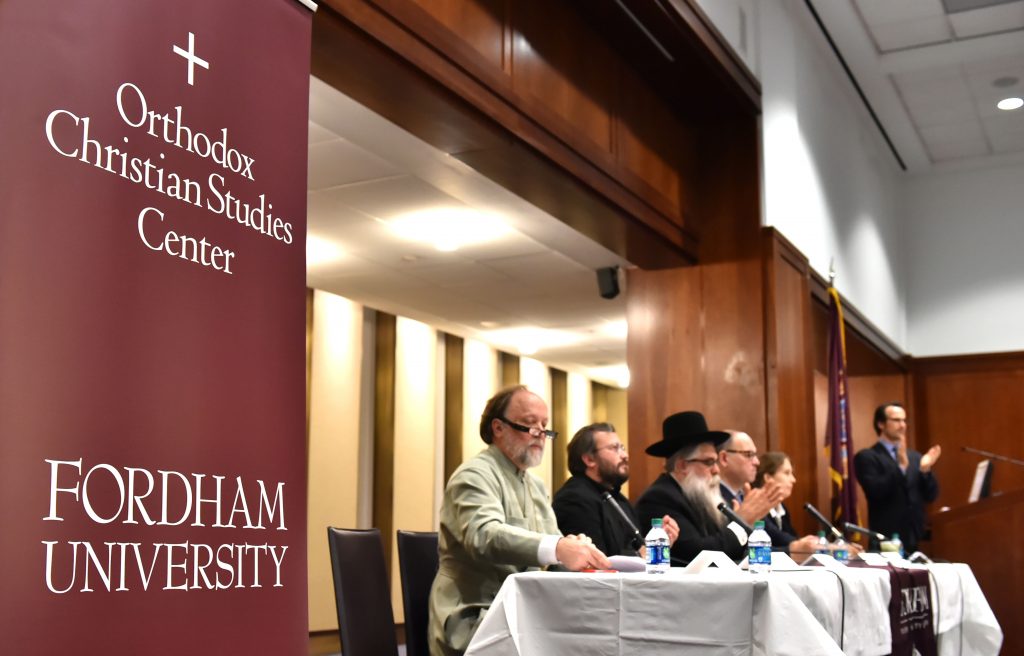
Rabbi Bleich gave the example of his own experience in a government-organized group called the All-Ukrainian Council of Churches and Religious Organizations.
“We would come to meetings once a month and talk about essentially nothing because the agenda was set by government people,” Rabbi Bleich said about the organization, which has since claimed independence. “Basically, government took all the religious leaders, created an organization for us, then locked us in a room and threw away the key.”
The use of religion is just one smokescreen Putin has created to shape the ongoing conflict, said Adrian Karatnycky, nonresident senior fellow with the Atlantic Council. Another is to spread propaganda casting it as a “civil war.”
“By now it may have the elements of a civil war, but it is a civil war that was constructed from outside,” Karatnycky said. “There were only a few thousand people disgruntled and engaged in protest at first. Then there was a wave of trained fighters who came to reinforce them. Now this is a fight by a new group of people empowered by money and weapons from the Kremlin.”
In reality, the conflict is a military incursion, not a civil conflict, panelists said.
“There is no civil war. It’s a bunch of terrorists who are getting arms from people who have an interest in retaining the situation,” said Rabbi Bleich.
“People ask, ‘When will there be peace?’ It won’t be with Putin. Putin doesn’t want peace now. He wants the situation to stay the way it is — instability, a war economy, not allowing Ukraine to develop into a thriving democracy with its own economy, which will could dominate Russia.”
The panel featured:
- Rabbi Yaakov Dov Bleich, chief rabbi of Kiev and all of Ukraine and vice president (Ukraine) of the World Jewish Congress;
- Father Peter Galadza, the Kule Family Professor of Liturgy at the Metropolitan Andrey Sheptytsky Institute of Eastern Christian Studies at Saint Paul University, Ottawa;
- Father Cyril Hovorun, research fellow at Yale Divinity School;
- Adrian Karatnycky, nonresident senior fellow at the Transatlantic Relations Program with the Atlantic Council;
- Olena Nikolayenko, Ph.D., assistant professor of political science at Fordham; and
- Moderator Aristotle Papanikolaou, Ph.D., the Archbishop Demetrios Chair in Orthodox Theology and Culture and cofounder of the Orthodox Christian Studies Center.
The panel discussion was co-sponsored through gifts received from the Jaharis Family Foundation, Inc., the Nicholas J. and Anna K. Bouras Foundation, Inc., and the Office of Alumni Relations at Fordham.
]]>Crime and Punishment, a presentation sponsored by Fordham’s Office of Research, brought together Deborah Denno, Ph.D., the Arthur A. McGivney Professor of Law at Fordham University School of Law, Olena Nikolayenko, Ph.D., assistant professor of political science, and Edgar Tyson, Ph.D., assistant professor of social work in the Graduate School of Social Service.
Story continue below
 Edgar Tyson, Olena Nikolayenko, and Deborah Denno, during the question and answer period.
Edgar Tyson, Olena Nikolayenko, and Deborah Denno, during the question and answer period.
Photo by Patrick Verel
Faculty panelists reported on their recent research around the theme of crime, funded through grants from Fordham.
Tyson detailed the results of his survey of 305 police officers in a Northeastern city. An expert on the use of hip-hop music in social work therapy, Tyson wanted to know if police believed rap artists and their entourages to be more violent than average citizens.
Older officers, he discovered, hold that opinion of both groups, while their younger counterparts less so. This perception is troubling, Tyson said, because a study of 250 rap artists with arrest records revealed that they were less likely to commit a crime after they’d published their first album.
Nikolayenko’s research into hate crime and prosecution in Russia also dwells on misperceptions, in this case in Russia, where she used one court case to illustrate a larger problem involving the prosecution of hate crimes.
In one case, Rasul Mirzaev, a mixed martial artist from the Republic of Dagestan, scuffled with Ivan Agafonov, a native Russian, at a nightclub in Moscow in 2011. Agafonov died as a result. When charges against Mirzaef were downgraded from pre-meditated murder to a lesser charge, there was a backlash by Russian nativists.
“This case reflects the broader trend in Russian society, where the nationalists use these instances of interpersonal conflict between young men to try to frame it as something bigger [and]to provoke anti-migrant sentiments,” she said.
One of the biggest challenges Nikolayenko faced while trying to gather data about the prevalence of hate crimes in Russia are the nation’s laws. One law on the books, she said, allows the police to prosecute anyone as an extremist if the person so much as accuses a police officer of being an “extremist.”
Although official statistics on hate crimes in Russia show they have been dropping since 2007, the trend is more a reflection of under-reporting or misclassification of a hate crime as “hooliganism,” she said, than an actual decrease.
“The focus on hate crimes is important because it can inform our understanding of political stability in the country, and also the challenge of democratization,” she said.
Denno reported on her study of 33 criminal cases between 2007 and 2011, in which behavioral genetics evidence was introduced by defendants. Alcoholism, substance abuse, and diseases such as schizophrenia are examples of the kinds of evidence that might be used by defense lawyers.
“Criminologists are always interested in what predicts crime and what causes crime, and behavioral genetics evidence is one large facet of that, particularly more recently,” she said.
Denno suggested that not only is much of the controversy surrounding genetics-related evidence unwarranted, but the use of such evidence has been greatly misunderstood. Such evidence, she said, has never been presented as a way to excuse a defendant from having committed the crime; rather, it was used as a way to avoid the death penalty.
Jared Lee Loughner, who pleaded guilty to murder charges for the shooting of Senator Gabrielle Giffords in 2011, is a good example. One way his lawyers kept him from death row was to research his family tree back to the 1800’s and prove his ancestors suffered from schizophrenia.
“When lawyers use behavioral genetics evidence, it’s almost entirely used in the context of a lot of other kinds of factors,” Denno said. “Anyone who does research in these areas would know that behavioral genetics evidence is much more enlightening about what effect environmental factors have on a defendant than anything inherent to that defendant.”
]]>on television that Mikhail Gorbachev, the leader of the Soviet Union, had resigned.

Photo by Bruce Gilbert
From that moment on, life changed for the teenager.
“Ukraine gained national independence in 1991, so I saw dramatic political and socioeconomic change in the country,” said Nikolayenko, Ph.D, assistant professor of political science. “We were no longer required to study the communist ideology. At school, we threw out Soviet-era history textbooks and began to learn forbidden episodes of Ukrainian history.”
Twenty years later, however, the change that most post-Soviet nations had hoped for still remains distant.
“When the Soviet Union fell apart, there was a lot of euphoria about the triumph of democracy in the post-communist region,” she said. “In fact, out of 15 former Soviet Republics, only three—Estonia, Latvia, and Lithuania—can be considered democratic right now, 20 years after the collapse.”
An expert in youth and politics, Nikolayenko specializes in how young people participate in politics in non-democracies. Her recent article, “Tactical Interactions Between Youth Movements and Incumbent Governments in Post-Communist States,” forthcoming inResearch in Social Movements, Conflicts and Change, examined a series of youth protests that permeated the region in the late 1990s and early 2000s.
“There has been a tide of nonviolent youth movements in the post-communist region… that emerged to demand political change against the incumbent rulers,” she said. “I wanted to examine why some youth movements are more successful than others in mobilizing citizens against these regimes.”
In 2000, Nikolayenko said, a group of Serbian students set the tone for this spate of youth activism with a movement known as Otpor, meaning “resistance.” The youth movement threw a New Year’s party in downtown Belgrade, attracting thousands in the capital city to usher in the new millennium with a free concert and a night of festivities.
But at midnight, Otpor halted the celebration. Images of citizens and soldiers who had been killed in recent conflicts flashed across a projection screen. Serbians had nothing to celebrate, the activists said. Instead, they ought to return home and think about how to change the situation.
In the months that followed, Otpor created a “culture of resistance.” Bearing the symbol of a clenched fist, the group organized peaceful protests in the form of media campaigns, graffiti, and political stickers, urging Serbians to “live resistance” daily.
When September’s fraudulent elections restored incumbent president Slobodan Miloševic to power, thousands of Serbians flooded the streets. Their protests, combined with international pressure, compelled Miloševic’s resignation.
Youth movements throughout the region followed Otpor’s example, said Nikolayenko. In 2001, the Belarusian movement Zubr (“Bison”) called for the removal of the incumbent president. Kmara (“Enough”) was launched in the Republic of Georgia prior to the 2003 parliamentary elections. A year later, Pora (“It’s Time”) emerged in Ukraine, followed by Yeni Fiki (“New Thinking”), Maqam (“It’s Time”), and Yokh (“No”) in Azerbaijan.
What united these groups, Nikolayenko found, was a commitment to nonviolence and the use of youth-oriented activities such as rock concerts and street performances. Each was also successful in drawing young people to the polls.
“Obviously there are multiple factors at play when you try to explain the resignation of the incumbent president or the breakdown of a regime, and youth are just one of the players,” Nikolayenko said. Nevertheless, “this wave of youth mobilization against the non-democratic regimes occurred on an unprecedented scale.”
Nikolayenko has also studied how the current generation—the first to grow up without the firsthand experience of communism—form political attitudes. While a graduate student, she surveyed Russian and Ukrainian adolescents about their political opinions and whether they felt what she called “Soviet nostalgia,” that is, whether they thought the dissolution of the Soviet Union was a positive or negative event for their countries.
“If they said it was negative, then it would mean that they harbored some sort of nostalgia, or regret about the collapse. And if they positively viewed the Soviet demise, then it would mean they turned over this page in their country’s history.”
She found that the majority of Ukrainian adolescents viewed the Soviet Union negatively and endorsed its collapse. Alternatively, less than half of Russian adolescents viewed the collapse negatively. As she contends in her recent book, Citizens in the Making in Post-Soviet States(Routledge, 2011), this attitudinal difference comes in part from the differences in the two countries’ educational systems, particularly how history textbooks narrate the Soviet period, including Stalin’s reign, and World War II.
Up next for Nikolayenko is research on “the darker side of civil society.” This fall she will use a faculty fellowship to study a rise in hate crimes that have occurred in Russia. These crimes have largely been committed by young men, many of whom are members of skinhead groups, who have targeted Central Asian migrants seeking employment in Russia. To make matters worse, she said, the migrants lack legal protection both in the host society and home country.
The phenomenon points to the reality that many post-Soviet nations have a long road ahead.
“It’s naïve to assume that once communism collapsed, these countries would make a swift transition to democracy,” she said. “The post-Soviet region provides a laboratory for the study of authoritarianism in the post-Cold War period, because citizens in these countries still continue to suffer under repressive political regimes.”
]]>